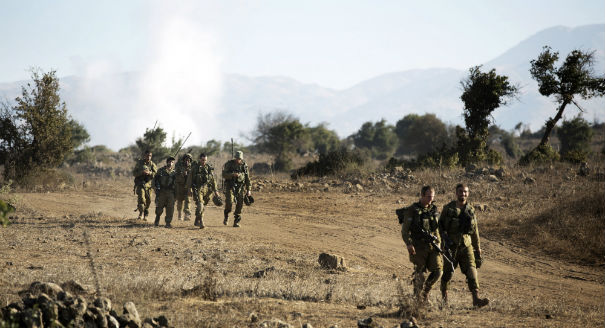Israeli Prime Minister Binyamin Netanyahu declared, at the outset of the Syrian uprisings in 2011, “I extend it [Israel’s hand] to the people of Syria, Lebanon and Iran, with awe at the courage of those fighting brutal repression." However, less than a month later, Netanyahu said that an Islamic wave—that is, anti-Western, anti-liberal, anti-Israeli, and ultimately anti-democratic—is washing through the Arab countries. Given the accelerating events on the ground, the Israeli leadership started to re-evaluate its stance on the ongoing events. Its intelligence services have had to brainstorm possible alternatives to the current regime should Assad be toppled, and the kind of security developments that would ensue. Israel has decided not to adopt “the enemy of my enemy is my friend” principle in the Syrian case—because all sides of the conflict are hostile to the Jewish state.
Previously, and although Syria and Israel are officially in a state of war, the Syrian regime has always managed to respect the red lines of the Israeli leadership. Undeclared trust between the two regimes has developed, and the Israel-Syria border has remained rather quiet since 1973. Despite the fact that the Assads have largely managed to preserve some form of calm along the border with Israel, a victory for Assad in the current war against the opposition will be considered a victory for Hezbollah and Iran—both of which are now active combatants in Syria's war. A win for the Assad regime will allow Iran to extend its ability to project power regionally—becoming more of an acute threat to Israel.
The opposition is no great alternative for Israel either as hostile armed Islamist groups dominate the Syrian opposition forces. Commenting on this, IDF intelligence chief Maj.-Gen. Aviv Kochavi remarked that "right before our eyes a center of global jihad is developing on a scale that may affect the borders of the State of Israel." Israel particularly dreads the idea of Syrian chemical weapons falling into the hands of Islamic radicals. A barrier that runs along most of the Israeli-Syrian border is expected to be completed this month to prevent any attempts from radical groups to cross the borders and attack Israeli citizens or soldiers.
What could Israel do to deal with the two threats? A prolonged conflict with maximum destruction to both sides may be the best way to ensure Israel's security and guarantee its future. First, the war is creating an anti-Iran sentiment in some parts of Syria and the rest of t he Arab world. This achieves an accidental alignment between Arab countries and Israel that distracts from the Arab-Israeli conflict. Second, Syria's conflict is depleting Iran's resources, which are already reeling from sanctions. A few thousand Hezbollah fighters are involved in the Syrian fighting, and many of its fighters who fought against Israel for two decades have either been killed or wounded on Syrian lands. A prolonged conflict is likely to turn Syria into Iran's Vietnam—exhausting Iran and Hezbollah and straining their resources. Third, as long as the conflict is going on in Syria, Israel no longer faces pressure to cede the Golan Heights, which it has occupied since 1967.
The Arab Spring has produced a great deal of change in Israel’s political and strategic environment. Not only has it led to the fall of some of Israel’s allies and the emergence of new regimes that are less inclined to establish relationships with it, but it has also added a new factor to the process of Arab decision making—the popular will of people, which may not accept security arrangements with Israel.
Haian Dukhan is PhD candidate at the University of St Andrews, Centre for Syrian Studies, Scotland.
For an alternate take on this issue, read Oded Raanan's “A Lose-Lose Situation."





